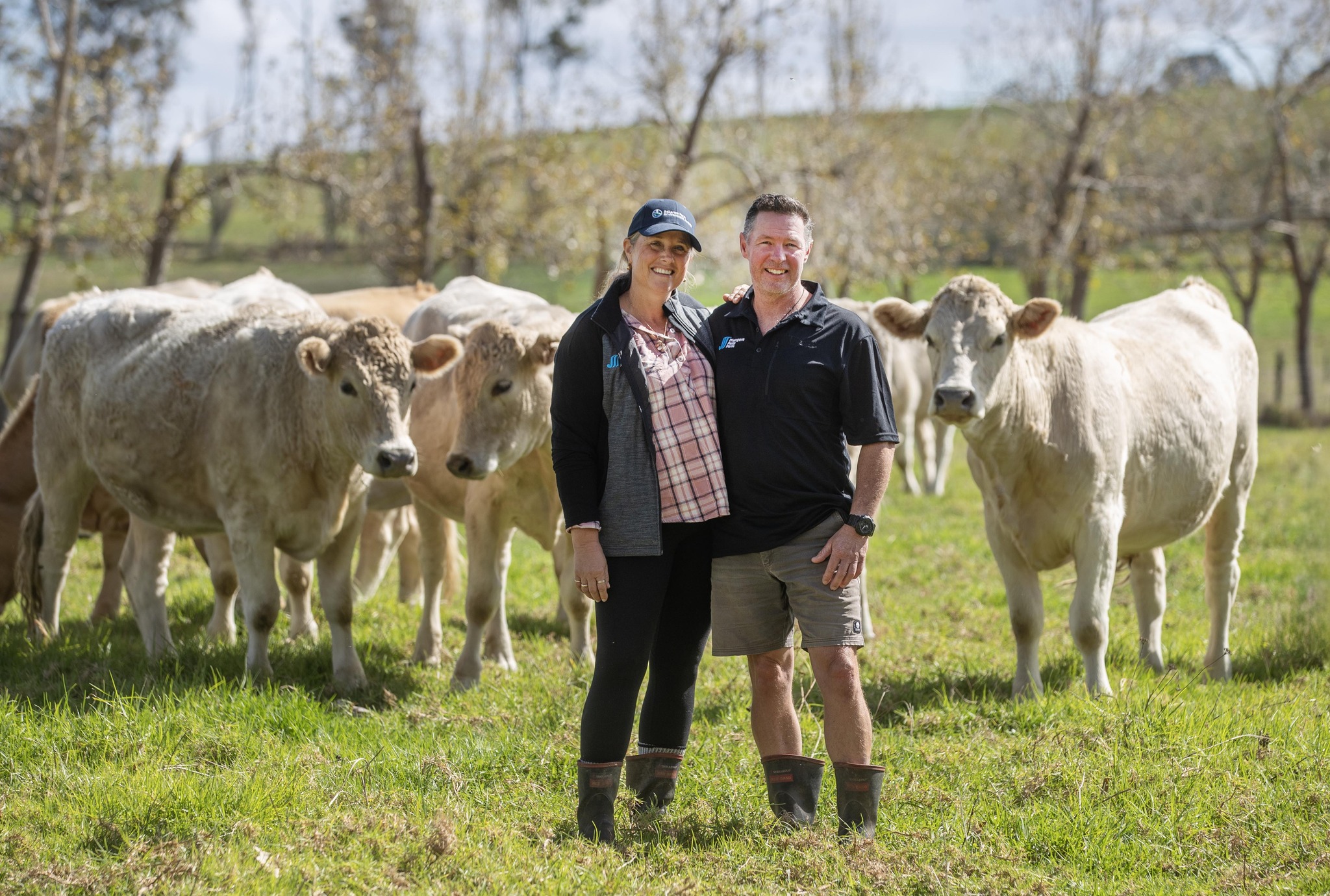By Hugh Stringleman,Silver Fern Farms
Copyright farmersweekly

Reading Time: 6 minutes
Premium beef production from an environmentally progressive farm has won Northlanders Rob and Mandy Pye a series of awards and recognition in recent years.
Mangere Falls Farm, in flat to rolling country about 20km inland from Whangārei, was the supreme winner of the Ballance Farm Environment Awards for 2025 in Northland.
Mangere Falls beef production was one of five national finalists in the Silver Fern Farms Plate to Pasture Supplier Awards in 2021 and again in 2025, for the Upper North Island, Waikato, Bay of Plenty and Northland.
Seven SFF regional Plate to Pasture awards have also been awarded to the Pyes’ farming business.
The Plate to Pasture Farmer Conference is rich in content with considerable detail about the markets and customers, Mandy said, and the couple have attended three events.
The Pye family business is on 335 hectares total farm platform (325ha effective) with the 260ha home farm at Kōkopu and 75ha support block at Puwera, about 25 minutes away.
The home farm is leased from Mandy’s family and is bounded by two rivers, the Mangere and the Wairua, with 6km of riparian fencing and cattle exclusion completed about three years back.
The Pyes have planted more than 22,000 native trees over the past seven years to help improve native biodiversity and bring back more native bird life.
“The river boundaries bring a huge responsibility to care for the waterways and make sure that what runs off our farm is the best quality possible,” Mandy said.
She lived on what was the Savill family farm in childhood and returned 20 years ago with Rob, when they were both school teachers.
The farm continued on with drystock cattle trading, not dairying, during their tenure. Rob learned cattle finishing from Mandy’s father, Bruce.
Some 600 finishing steers in total come on to the farm at 400kgLW at different times of the year and spend six to eight months before slaughter at a 650kg target weight, ideally before their second winter but they can be 24 to 30 months of age.
About 50 dairy-beef calves are also hand-reared and then finished to slaughter at a little lighter weights.
Finished cattle target Silver Fern Farms premium contract periods with an ability to be counter-seasonal because of Northland’s milder winters.
When they have been shipped, Rob buys in more rising two-year-olds on the same market to ensure his trading margins.
At present the buy-in prices might be around $5 a kg LW, or $2000 a head, while the schedule price plus premiums are up around $2800-$3000.
He favours Charolais, Angus, Hereford and Belgian Blue crosses with Friesian, mostly bought in the paddocks by trusted agents showing videos for prior approval or on bidr.
“We are going further afield for suitable cattle, which I put down to land use change in the north. We are looking for different genetics, better yielding prime cattle.
“Dairy farmers stand to benefit from using good beef genetics, to pass on down the chain to calf rearers and cattle finishers.
“We also have the facilities to do more dairy-beef calf rearing, which our son Daniel would manage, from local dairy farmers keen on using new LIC genetics like Synergizer and Stabiliser.”
The Pyes were impressed with the presentation from LIC on these new genetics at the SFF Farmers Conference in Hamilton in July.
They are keen to compare growth rates of hand-reared bulls with steers, expecting the latter to take 24 to 30 months to finish compared with 20-22 months for the bulls.
“Also, finishing at lighter weights is better for our farm environment and potentially the crossbred bulls have higher yields and still make the 320kg CW target,” Rob said.
Another on-farm trial was cell grazing of BB-cross bulls compared with rotational grazing, but very little difference was measured.
“Cell grazing can be harder on the farm, which has rock and hard pans underneath preventing drainage.”
Most of the riparian zones are fenced with single-wire electric because of the regular annual floods down the Mangere and Wairua rivers.
Now drainage corridors that run in heavy rainfall are being fenced and planted, perhaps including a stock crossing where needed.
All fertiliser spreading and kikuyu mulching is done behind the farm tractor, so crossings and drains are very important for safety.
In rain events the Mangere and Wairua quickly go brown with sediment upstream of Mangere Falls Farm and it is now noticeable that the run-off from the farm is clearer as sediment is slowed down and retained.
“All the land owners in the Kokopu district have a real positive view of environmental care and water quality,” Mandy said.
While the Mangere is over-allocated to about 20 dairy farms in the upper catchment, the falls have never run dry in the 20 years the Pyes have lived there.
Tangata whenua have a centuries-old Mangere Falls guardianship and the Pyes value that association and understanding.
The return of fish species and a possible ladder around the falls are projects for the iwi and local farmers.
The Pyes are SFF shareholders, fully shared, and the consistent and loyal relationship is now paying dividends in priority killing and contract premiums, for which they consign 11 months of the year and maintain their FAP-Plus status.
“Our partnership with SFF means we are rewarded for producing quality beef and for caring about the environment in which these cattle are farmed,” Mandy said.
SFF has provided feedback to the award winners about high-end prime beef markets in China and the United States, where Wholefoods is a customer, and the United Kingdom, including Sainsbury’s.
“Sainsbury’s wants the lower carbon footprint supply that relies upon our environmental efforts on farm,” Mandy said.
Mangere Falls Farm is New Zealand Farm Assurance Programme Plus gold standard with monitoring on carbon sequestration, freshwater quality, land use, nutrient budgeting and a native biodiversity plan.
The latter is targeting unproductive areas of the farm for livestock exclusion, native planting and pest control to encourage birds and freshwater fish species like the giant kōkopu, which the district takes its name from.
Rob recently joined the Northern North Island Farmer Council of Beef + Lamb New Zealand. As a former primary school teacher he has a fortnightly FaceTime interaction, Farmer Time, with children at Maniototo Area School in Ranfurly who want to learn about farming in a very different climate from their home.
“They want to know about your farm dogs, what breeds of cattle are best and animal health problems like tuberculosis.
“Next time they want to see me weighing cattle. The aim of Farmer Time is to connect urban kids with country life. Some kids have no idea about the realities of farming or where the meat they eat comes from.”
The Northland and national Ballance Farm Environment Award judges praised the exceptional condition and temperament of the Pye cattle.
They noted that strategic grazing and runoff management reduces sediment and nutrient leaching, safeguarding freshwater quality on their own land as well as contributing to the wider catchment’s environmental health.
The judges were impressed by the farm’s incredible progress, saying this was due to excellent management, strong governance and tireless effort.
They also praised Rob and Mandy’s resilience and adaptability, noting they are continuously improving their systems to meet environmental and business goals.
“Their commitment to passing on a sustainable, thriving farm to future generations makes them true industry leaders.”
– This article was made possible by Silver Fern Farms.



